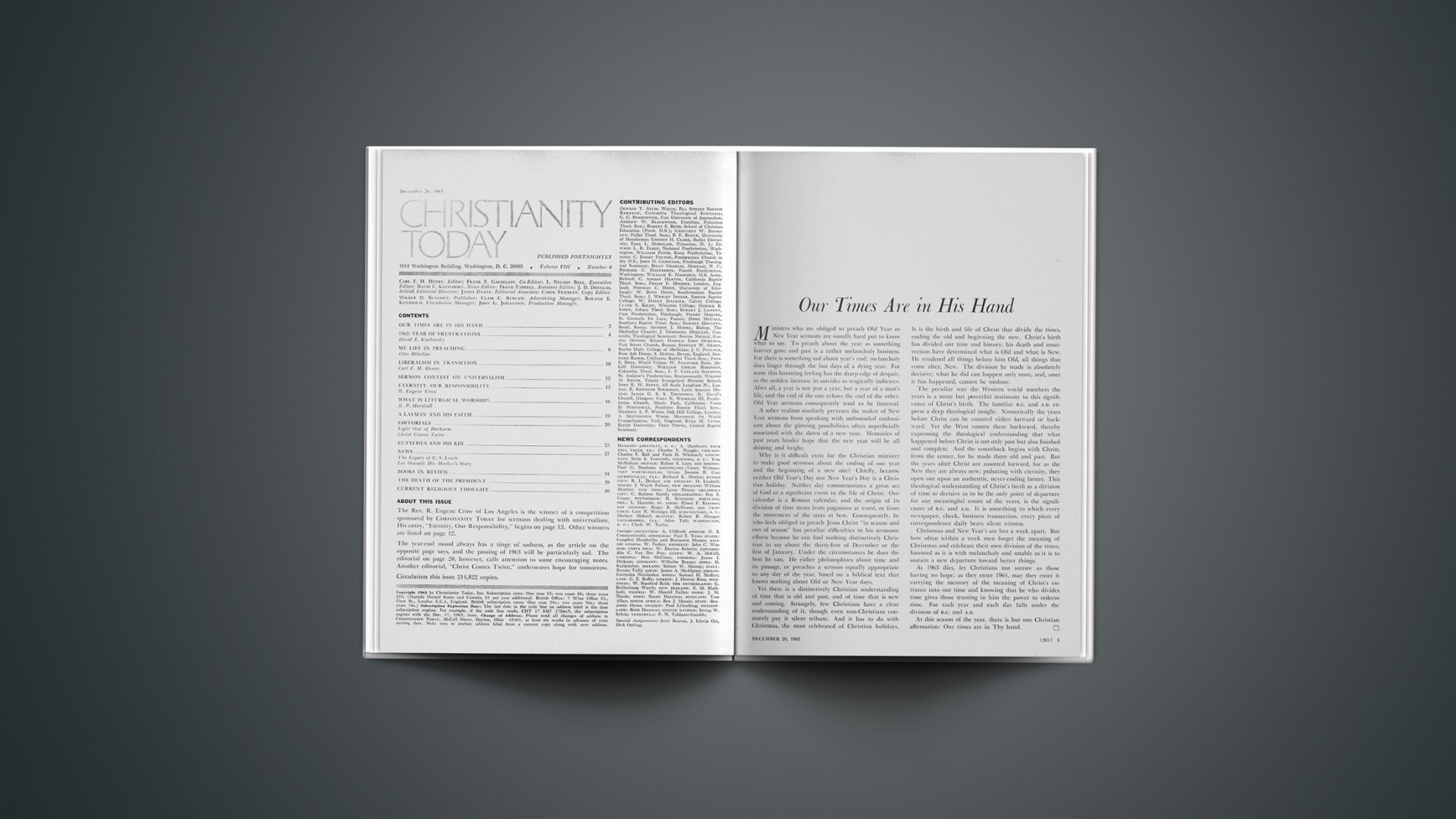Ministers who are obliged to preach Old Year or New Year sermons are usually hard put to know what to say. To preach about the year as something forever gone and past is a rather melancholy business. For there is something sad about year’s end; melancholy does linger through the last days of a dying year. For some this haunting feeling has the sharp edge of despair, as the sudden increase in suicides so tragically indicates. After all, a year is not just a year, but a year of a man’s life, and the end of the one echoes the end of the other. Old Year sermons consequently tend to be funereal.
A sober realism similarly prevents the maker of New Year sermons from speaking with unbounded enthusiasm about the glowing possibilities often superficially associated with the dawn of a new year. Memories of past years hinder hope that the new year will be all shining and bright.
Why is it difficult even for the Christian minister to make good sermons about the ending of one year and the beginning of a new one? Chiefly, because neither Old Year’s Day nor New Year’s Day is a Christian holiday. Neither day commemorates a great act of God or a significant event in the life of Christ. Our calendar is a Roman calendar, and the origin of its division of time stems from paganism at worst, or from the movement of the stars at best. Consequently, he who feels obliged to preach Jesus Christ “in season and out of season” has peculiar difficulties in his sermonic efforts because he can find nothing distinctively Christian to say about the thirty-first of December or the first of January. Under the circumstances he does the best he can. He either philosophizes about time and its passage, or preaches a sermon equally appropriate to any day of the year, based on a biblical text that knows nothing about Old or New Year days.
Yet there is a distinctively Christian understanding of time that is old and past, and of time that is new and coming. Strangely, few Christians have a clear understanding of it, though even non-Christians constantly pay it silent tribute. And it has to do with Christmas, the most celebrated of Christian holidays. It is the birth and life of Christ that divide the times, ending the old and beginning the new. Christ’s birth has divided our time and history; his death and resurrection have determined what is Old and what is New. He rendered all things before him Old, all things that come after, New. The division he made is absolutely decisive; what he did can happen only once, and, once it has happened, cannot be undone.
The peculiar way the Western world numbers the years is a mute but powerful testimony to this significance of Christ’s birth. The familiar B.C. and A.D. express a deep theological insight. Numerically the years before Christ can be counted either forward or backward. Yet the West counts them backward, thereby expressing the theological understanding that what happened before Christ is not only past but also finished and complete. And the countback begins with Christ, from the center, for he made them old and past. But the years after Christ are counted forward, for as the New they are always new; pulsating with eternity, they open out upon an authentic, never-ending future. This theological understanding of Christ’s birth as a division of time so decisive as to be the only point of departure for any meaningful count of the years, is the significance of B.C. and A.D. It is something to which every newspaper, check, business transaction, every piece of correspondence daily bears silent witness.
Christmas and New Year’s are but a week apart. But how often within a week men forget the meaning of Christmas and celebrate their own division of the times, haunted as it is with melancholy and unable as it is to sustain a new departure toward better things.
As 1963 dies, let Christians not sorrow as those having no hope; as they enter 1964, may they enter it carrying the memory of the meaning of Christ’s entrance into our time and knowing that he who divides time gives those trusting in him the power to redeem time. For each year and each day falls under the division of B.C. and A.D.
At this season of the year, there is but one Christian affirmation: Our times are in Thy hand.









